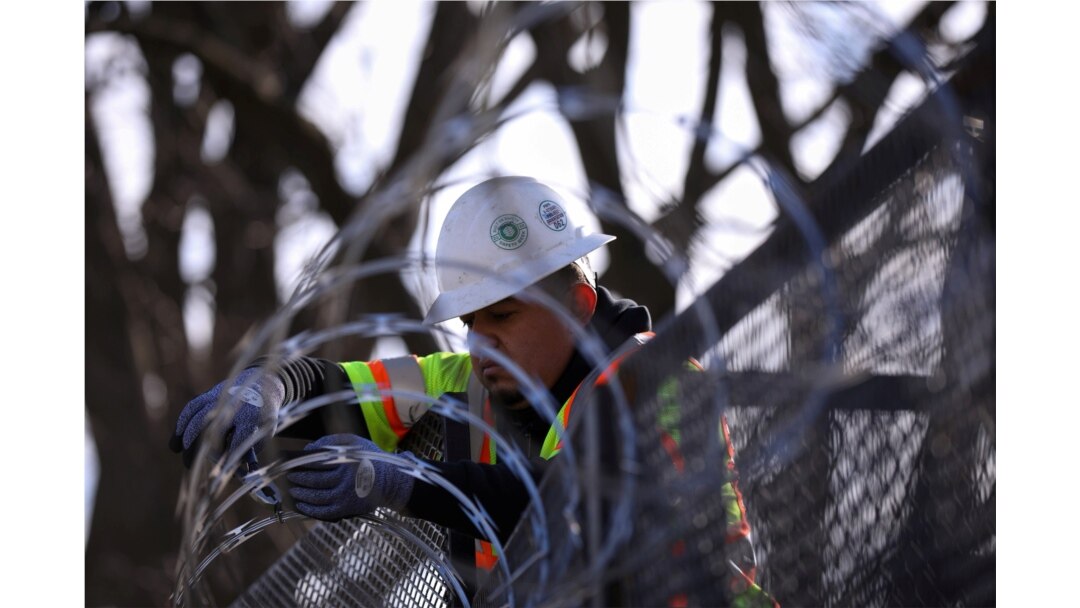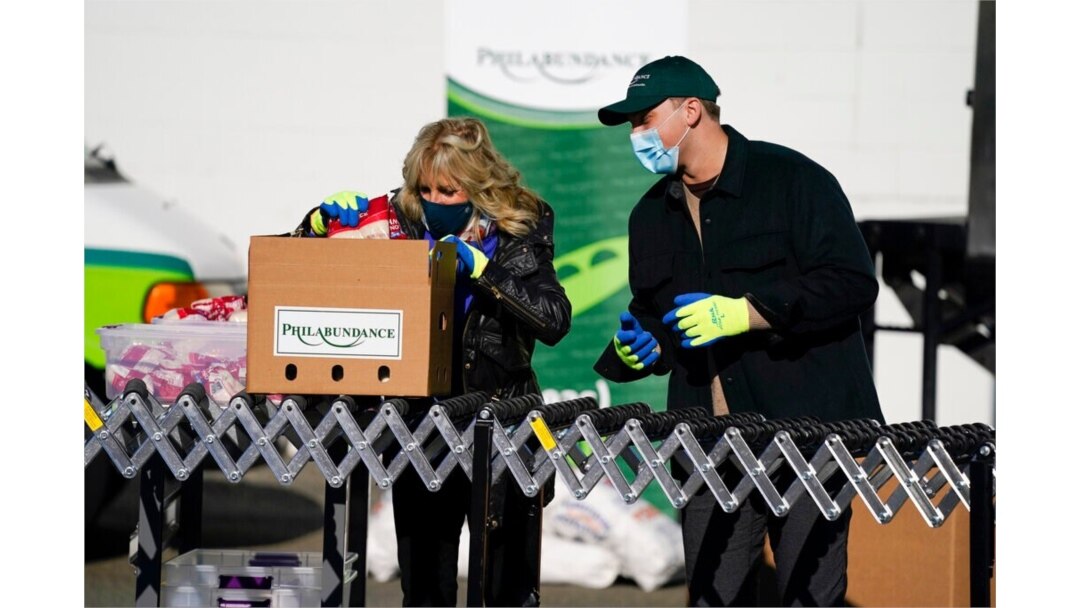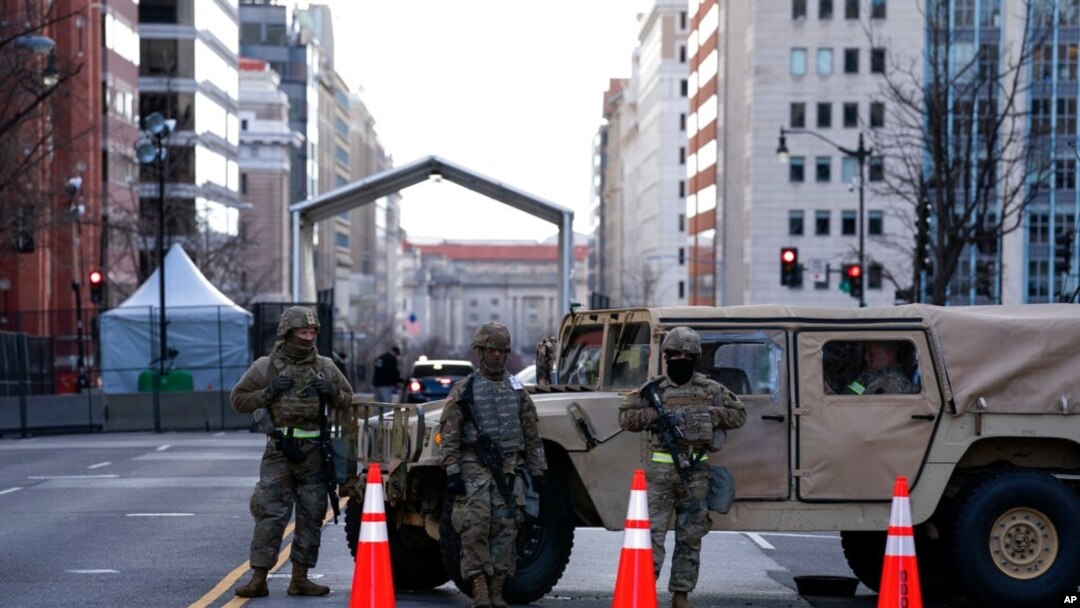U.S. security officials say they are taking every precaution to guard against an attack on President-elect Joe Biden’s inauguration Wednesday on the steps of the U.S. Capitol, including FBI security screening of the 25,000 members of the National Guard assigned to Washington to protect the event.
“While we have no intelligence indicating an insider threat, we are leaving no stone unturned in securing the capital,” acting Secretary of Defense Christopher Miller said in a statement.
He said the troops are being given extra training as they arrive in Washington and told “that if they see or hear something that is not appropriate, they should report it to their chain of command.”

A worker installs razor wire on fencing in front of the U.S. Capitol as an extra security measure in Washington, Jan. 18, 2021.
U.S. intelligence reports have suggested that some protesters holding on to the belief that outgoing President Donald Trump was cheated out of reelection might try to disrupt Biden’s swearing-in ceremony and inaugural celebration.
The inaugural site is encircled in tall fencing topped with concertina wire, a much more pronounced show of security than has been common at past quadrennial inaugurations.
Security is a bigger focus than usual, with the inauguration coming two weeks after thousands of supporters of Trump stormed the domed Capitol after he urged them to march to the building as lawmakers met to certify Biden’s victory.
Two days before assuming power, Biden and his wife, Jill Biden, spent part of Monday volunteering at a food bank, Philabundance, in the large eastern city of Philadelphia, Pennsylvania. The Bidens volunteered on the National Day of Service commemorating the annual holiday honoring the late civil rights leader, the Rev. Martin Luther King Jr.

President-elect Joe Biden's wife, Jill Biden, participates in a National Day of Service event at Philabundance, a hunger relief organization, in Philadelphia, Jan. 18, 2021.
In Washington, military and musical groups marched in front of the White House, rehearsing for Biden’s inaugural parade, although the event has been significantly downsized from previous inaugurations because of the soaring number of coronavirus cases in the U.S.
Much of the celebration of Biden’s inauguration will be conducted virtually, with bands and groups appearing from all 50 U.S. states.
As they arrive in Washington on Tuesday from their home in the eastern state of Delaware, the Bidens and Vice President-elect Kamala Harris and her husband, Douglas Emhoff, plan to turn on 400 lights alongside the reflecting pool at the Lincoln Memorial to honor the nearly 400,000 Americans who have died in the coronavirus pandemic.
Thousands of U.S. flags are seen at the National Mall near the Capitol, ahead of President-elect Joe Biden's inauguration, in Washington, Jan. 18, 2021.
Other landmarks across the U.S., including the Empire State Building in New York and the Space Needle in Seattle, Washington, are being illuminated at the same time as the Washington event on the National Mall.
The immediate area around the Capitol, where Biden and Harris will take the oath of office, is a virtual armed encampment.
Authorities have also closed the National Mall along with roads and Metro subway stations in much of downtown Washington. Bridges into the city from the state of Virginia are also being closed. Thousands of National Guard troops and law enforcement officers are stationed across the area to protect against further violence.
Despite the heightened security concerns, Biden plans to go ahead with the inauguration ceremony in its traditional location.
“Our plan and our expectation is that President-elect Biden will put his hand on the Bible with his family outside on the west side of the Capitol on the 20th,” Kate Bedingfield, Biden’s incoming communications director, told ABC’s “This Week” show.
She said the Biden team has “full faith in the United States Secret Service and their partners who have been working for over a year on the planning to ensure (the inauguration) is safe.”
Streets sit largely deserted as National Guard personnel and police close off a block, Sunday, Jan. 17, 2021, in Washington, as part of increased security ahead of the inauguration of President-elect Joe Biden and Vice President-elect Kamala Harris.
Trump has refused to concede his defeat or congratulate Biden, while acknowledging there will be a “new administration” come Wednesday.
Trump, ignoring 160 years of the U.S. tradition of an outgoing president attending his successor’s swearing-in ceremony to demonstrate a peaceful transfer of power, has announced he plans to skip the inauguration. Vice President Mike President is planning to attend.
Trump instead is planning to leave Washington on Wednesday morning with a red-carpet ceremony as he boards Air Force One for a flight to his Atlantic Ocean retreat in Florida.
Trump’s plan has drawn criticism, including from a group of five Democratic members of the House of Representatives who in a letter Saturday to acting Secretary of Defense Christopher Miller and Joints Chiefs of Staff Chairman Mark Milley urged the Pentagon to not divert any resources for what they called a “disruptive departure ceremony for the outgoing president.”
"The proposed action is unwise, unconventional, and most importantly, puts the national security needlessly at risk by diverting essential personnel and resources from the protection of the U.S. Capitol, where all of the institutions of government will be represented, to providing for the security, protection, and transport of the outgoing president,” the lawmakers wrote. Signatories included Congresswomen Sheila Jackson Lee and Jan Schakowsky and Congressmen André Carson, Steven Cohen and Danny Davis.
House Speaker Nancy Pelosi of California signs the article of impeachment against President Donald Trump in an engrossment ceremony before transmission to the Senate for trial on Capitol Hill, in Washington, Jan. 13, 2021.
The House last week impeached Trump for a second time, accusing him of inciting insurrection, and his Senate trial is set to start soon after Biden’s inauguration. If convicted, Trump, the first U.S. president to be impeached twice, could be barred from ever again holding office.
Before he leaves office, however, Trump is expected to grant several more pardons, possibly to key supporters convicted of crimes or facing trials.
People familiar with the matter said Trump met Sunday with aides to finalize a list of more than 100 pardons and commutations to issue before his term ends. White House advisers have said Trump has had discussions about preemptively pardoning himself and other family members, none of whom have been charged with any crimes, but that at this point he is not expected to do so.
Bedingfield said Sunday Biden is planning to lay out a “positive, optimistic” vision for the country in his inaugural address on Wednesday and “try to turn the page on the divisiveness, and the hatred of the last four years” under Trump.
“I think that’s what Americans all across the country want,” Bedingfield said. “They want a government that once again is focused on doing the right thing by them and helping them in their day-to-day lives.”
Once in power, Biden plans to quickly overturn numerous Trump policies.
Incoming White House chief of staff Ron Klain said Saturday night that Biden “is assuming the presidency in a moment of profound crisis for our nation. We face four overlapping and compounding crises: the COVID-19 crisis, the resulting economic crisis, the climate crisis, and a racial equity crisis.”


